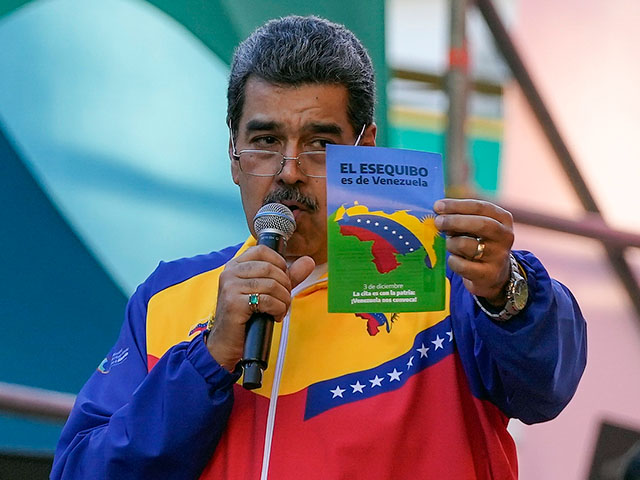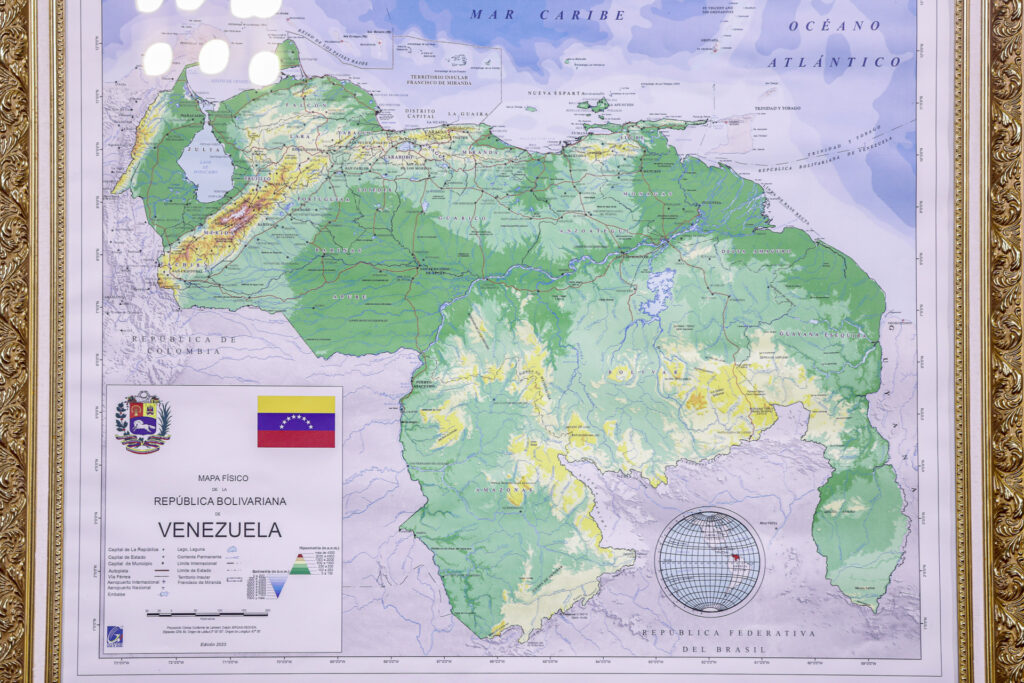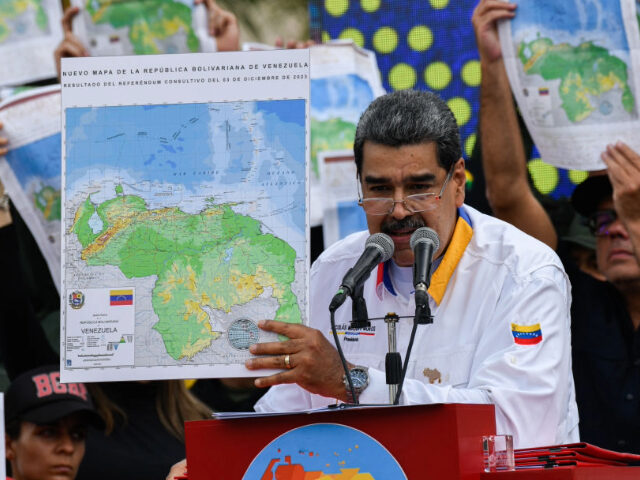Venezuela’s socialist regime approved a law on Thursday to “formally” create a new state out of two-thirds of neighboring Guyana, annexing the historically contested Essequibo territory.
The 39-article law, named “Organic Law for the Defense of Guayana Esequiba,” established the purported creation of a new state for Venezuela called Guayana Esequiba that will allegedly consist of the Essequibo, a 61,600-square-mile territory that Guyana currently administers and which represents approximately two-thirds of its entire territory.
The law, which the socialist-controlled National Assembly just recently approved, is part of the regime’s broader plans, announced in December, to annex the Essequibo region, which include granting Venezuelan identity documents to the region’s mostly indigenous inhabitants; issuing oil, gas, and mining licenses to exploit the resource-rich region; and establishing authorities to “administer” the territory and “preserve” its biodiversity.
The socialist regime claims that its annexation plans are part of a “mandate” stemming from the results of a sham five-question referendum held in early December, which asked “what to do” about the Essequibo dispute.
Despite the extensive footage showing low voter turnout and completely empty electoral centers, Socialist dictator Nicolás Maduro and his regime claim that more than “ten million” votes were cast in favor of his annexation referendum, an amount much higher than any other claimed turnout rates in previous sham elections.

Venezuelan President Nicolas Maduro gives a speech during the closing campaign on Venezuela Referendum on disputed territory with Guyana in Caracas, Venezuela, on December 1, 2023. (AP Photo/Matias Delacroix)
“The Organic Law for the Defense of Guayana Esequiba is declared sanctioned,” Jorge Rodríguez, the head of the National Assembly, wrote on social media. “We have fulfilled the people of Venezuela who came out en masse to say Yes five times on December 3!”
Se declara sancionada la Ley Orgánica para la Defensa de la Guayana Esequiba. ¡Hemos cumplido con el pueblo de Venezuela que salió masivamente a decir 5 veces Sí el pasado 3 de diciembre! pic.twitter.com/BFQHCkFTit
— Jorge Rodríguez (@jorgerpsuv) March 21, 2024
Venezuela and Guyana have maintained an over 120-year-old territorial dispute over the Essequibo. Venezuela has historically argued that the territory has been part of its borders since it gained independence from Spain in 1811 — 188 years before the current ruling “Bolivarian Revolution” rose to power in 1999.
In 1899, an arbitration process was held in Paris that established the current borders of both countries, granting control of the Essequibo to Guyana. Venezuela has historically contested the Paris ruling as fraudulent at the United Nations, leading to another agreement, signed in Geneva in 1966, that gave control of the Essequibo to Guyana until a permanent solution to the dispute was found.
The agreement has yet to reach a definitive conclusion, as the dispute remained relatively dormant in the following decades. The International Court of Justice (ICJ) ruled in 2023 that it has jurisdiction over the dispute but said a final ruling is “years away” from being issued.
Maduro appeared to rekindle the feud in response to Guyana’s decision to sign offshore oil drill contracts with American oil company ExxonMobil. The Maduro regime has repeatedly threatened ExxonMobil to abstain from conducting its operations with Guyana, going as far as to deploy the Venezuelan Navy in December 2018.

Al Drago/Bloomberg via Getty Images
The Maduro regime’s new law establishes a “set of means and mechanisms aimed at the defense” of the Essequibo territory, disregards the 1899 Paris arbitration, and “ratifies” the 1966 Geneva agreement.
The law also imposes several sanctions on those who do not “support” Venezuela’s territorial claims or sign contracts with Guyana.
Article 25 of the law states that those who “publicly favor the position” of Guyana will be penalized with a complete ban from running or holding any public office position. Article 27 states that the Venezuelan Executive may prohibit the signing of contracts or agreements with legal entities that are “operating or collaborating” with Guyana in the claimed territory on the “basis of concessions granted unilaterally.”
The law also requires that Venezuela’s political map display the new Guyana Esequiba state, establishing fines and sanctions for whoever “prepares, publishes or distributes maps, plans or charts” that omit the purported new state.

A general view of a map of Venezuela, including the territory of Essequibo, in Caracas, Venezuela, on December 8, 2023. (Pedro Rances Mattey/Anadolu via Getty Images)
The fines can range between 1,000 to 100,000 United States dollars, euros, or whichever foreign currency has the highest official exchange value against the Venezuelan bolivar at the time of the imposition of the fine. Similarly, fines can be imposed on those who “refuse to provide historical information of importance” of the territorial claim.
Top socialist regime strongman and suspected drug lord Diosdado Cabello celebrated the law’s approval by claiming that it “vindicates the right of the Venezuelan people to defend our territory with an approved law.”
“This law is a model and must serve for those who make decisions in the world to be very clear about Venezuela’s position from now on,” Cabello said. “This law must be complied with.”
The law’s transitory dispositions state that while the territorial dispute is being resolved and “elections” are held in the purported new state, Diosdado Cabello’s brother Alexis Rodriguez Cabello will serve as its “governor,” while other Venezuelan government offices will conduct other administrative and legislative functions.
The law will be sent to the Constitutional Chamber of the Supreme Court of Justice over the next few days to “rule” over its constitutionality. As the ruling socialists rule all Venezuelan courts, the judiciary is expected to approve the law.
Christian K. Caruzo is a Venezuelan writer and documents life under socialism. You can follow him on Twitter here.

COMMENTS
Please let us know if you're having issues with commenting.